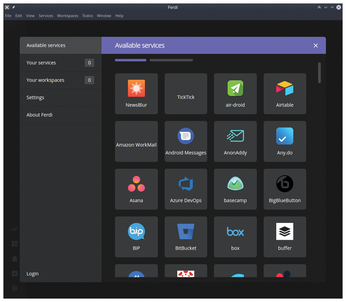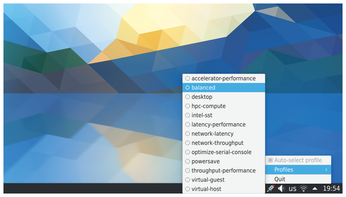FOSSPicks
Ferdi
Many of our day-to-day desktop applications, such as email and chat clients, text editing, music playback, and more have switched to become web applications. This puts a resource strain on our web browsers but also a cognitive strain on our brains as we struggle between using these applications and more traditional web searches and page views in a browser with dozens of tabs open. One possible solution to this is to offload these "Software as a Service" types of pages to a separate application, one that might even be able to aggregate shared functionality to make things even simpler. This is what Ferdi hopes to do, with an emphasis on applications that help us to communicate.
Ferdi does this via its own online service, but it's also possible to use the application without creating an account. Either way, when Ferdi first launches, you're presented with a list of web apps and services it supports. This list is huge, with more than 100 services supported, from Android Messenger to Zeplin – almost anything with a web client. If something isn't in the list, there's a good chance you can add it via a custom URL, and in our experience, it will work. Selecting or adding a service will step you through account authentication, after which the app will appear within a global toolbar on the left. The apps themselves operate exactly like their browser counterparts in a traditional web browser because they are. Ferdi isolates these web applications to help you to keep your focus and avoid too much context switching. It can also help limit or manage the time you spend checking Slack or Discord, for example, because they're confined to a single, different application, and it's handy having all unread notifications and services aggregated to a single place or icon. It would be great if this principle could be taken further, with time limits and access intervals when certain applications become available, but maybe those are possibilities for a future release.
Project Website
https://github.com/getferdi/ferdi

Performance profiles
Tuned Switcher
The Tuned service is a daemon that can control, or tune, certain performance-affecting hardware characteristics on your computer. This can help you squeeze the most from your machine when you need it for a specific application or simply for battery life. While it is possible to start by creating your own configuration for the tasks you need to perform, the service comes pre-packaged with profiles for certain tasks. These are split into two categories: power-saving modes and performance-boosting modes. Performance-boosting modes are useful when running virtualization software or when you want the best possible network performance. Power saving will help prolong battery life or keep your hardware from overheating. You can define and switch between profiles using configuration files, but there is a better way – an application called Tuned Switcher.
Tuned Switcher is a simple tool that can itself operate in two modes. The first, and default, is as an applet in your desktop system tray. When running from here, a right-click will open a menu containing a list of whatever Tuned profiles are installed on your system, including those for performance, virtualization, and network access. Selecting one will change the performance characteristics of your hardware and operating system immediately, and a notification pane will appear to inform you which mode has been selected. There's also an automatic function that will ensure an appropriate profile is always selected to match whatever job the system detects you're trying to accomplish. Alongside the applet, the second operating mode is a widget. This is more like a traditional desktop application but doesn't offer the same number of functions as the applet. For that reason, if a system can use either, the widget is selected by default. It's a simple but effective system that's going to be of most use to people traveling with a laptop, because it lets you put your hardware into a high-power performance mode when your environment might otherwise automatically preconfigure for battery life.
Project Website
https://github.com/EasyCoding/tuned-switcher

Buy this article as PDF
(incl. VAT)
Buy Linux Magazine
Subscribe to our Linux Newsletters
Find Linux and Open Source Jobs
Subscribe to our ADMIN Newsletters
Support Our Work
Linux Magazine content is made possible with support from readers like you. Please consider contributing when you’ve found an article to be beneficial.

News
-
So Long Neofetch and Thanks for the Info
Today is a day that every Linux user who enjoys bragging about their system(s) will mourn, as Neofetch has come to an end.
-
Ubuntu 24.04 Comes with a “Flaw"
If you're thinking you might want to upgrade from your current Ubuntu release to the latest, there's something you might want to consider before doing so.
-
Canonical Releases Ubuntu 24.04
After a brief pause because of the XZ vulnerability, Ubuntu 24.04 is now available for install.
-
Linux Servers Targeted by Akira Ransomware
A group of bad actors who have already extorted $42 million have their sights set on the Linux platform.
-
TUXEDO Computers Unveils Linux Laptop Featuring AMD Ryzen CPU
This latest release is the first laptop to include the new CPU from Ryzen and Linux preinstalled.
-
XZ Gets the All-Clear
The back door xz vulnerability has been officially reverted for Fedora 40 and versions 38 and 39 were never affected.
-
Canonical Collaborates with Qualcomm on New Venture
This new joint effort is geared toward bringing Ubuntu and Ubuntu Core to Qualcomm-powered devices.
-
Kodi 21.0 Open-Source Entertainment Hub Released
After a year of development, the award-winning Kodi cross-platform, media center software is now available with many new additions and improvements.
-
Linux Usage Increases in Two Key Areas
If market share is your thing, you'll be happy to know that Linux is on the rise in two areas that, if they keep climbing, could have serious meaning for Linux's future.
-
Vulnerability Discovered in xz Libraries
An urgent alert for Fedora 40 has been posted and users should pay attention.

